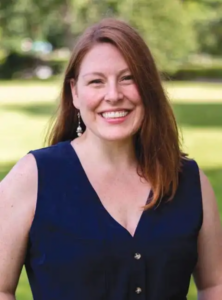Representation Matters: Town Councilor Heather Waters
 Heather Waters (photo by Ciara Studios)
Heather Waters (photo by Ciara Studios) This is part of The Humanist’s monthly series highlighting openly nonreligious elected officials across the nation. Because of the work of the Center for Freethought Equality, the political and advocacy arm of the American Humanist Association, there are over 100 elected officials at the local, state, and federal level who identify with the atheist and humanist community serving in thirty-two states across the country. Join the Center for Freethought Equality to help politically empower the atheist and humanist community—membership is FREE!
The Center for Freethought Equality’s advances have been groundbreaking. Prior to the 2016 election, there were only five state legislators and no members of Congress who publicly identified with our community; because of its efforts, today we have seventy-three state legislators and a member of Congress, Jared Huffman (CA-2), who publicly identify with our community. It is critical that our community connect and engage with the elected officials who represent our community and our values—you can see a list of these elected officials here.
Town Councilor Heather Waters
Serving Manlius, New York
“One supporter told me (while holding a check) that their continued support would be contingent upon me swearing in on the Bible. I let them know that I would not be able to do that.”
Born and raised in Manlius, New York, Town Councilor Heather Waters was elected to represent more than 30,000 residents as the first out LGBTQ+ person on the Manlius Town Board in 2019. She chairs the Police Committee, serves as Co-chair of the Comprehensive Plan Committee and Tree Commission, and is a member of the Critical Response and Deer Management committees.
As a champion of transparency in government, Waters authored the updated Town public meeting rules and launched the Open Podium public comment program. She also initiated and oversaw the Town’s pay equity audit, and launched the Town’s first recognition of Pride month.
In addition to her public service, Waters is a professional fundraiser and trained mediator. From 2013-2021, she served as an Assistant Dean for Advancement at Syracuse University School of Education. She currently lives in Fayetteville, NY with her husband, Sterling Waters, and their 11-year-old, Riley.
Sarah Levin: What motivated you to run for office?
Heather Waters: I was politically active in national efforts to stem the impact of the Citizens United ruling. (Money is not speech, and corporations are not people!) It wasn’t until I returned to my hometown in Central NY that I considered running. I campaigned for progressive candidates like Dana Balter and Cynthia Nixon, which was energizing. In terms of running myself, I knew that I would be able to communicate my long-term commitment to the town. I also looked at what governing was happening and realized that many folks had no clear representation on our town board.
Levin: What are your policy priorities and how does your nonreligious worldview impact your policy platform?
Waters: When I was elected in 2019, it was on a platform of transparency, sustainability, and developing our town’s first comprehensive plan. But we can’t plan for everything. After being sworn in, we faced the COVID-19 pandemic and a much deeper recognition of systemic racism (and our responsibility to dismantle it) following George Floyd’s murder. Officials all over, but certainly in NY State, had to learn how to address fears and vaccine hesitancy and develop actions to look at police reform. I trust the science behind vaccination and public health practices and the data and experience of those providing and seeking equal protection in public safety. I wanted to be a steady and rational voice responding to and facing challenging issues head-on. And as for my current re-election platform, I am eager to help implement our comprehensive plan and continue to engage many residents in all stages of life.
Levin: Why was it important for you to be open about your nonreligious identity?
Waters: So often, faith communities have leaders that reach out to local electeds and then carry back messages to their congregants. And larger faith groups can have louder voices! We branded our open comment period at the beginning of each meeting as “Open Podium” to ensure people knew that all voices were welcome anytime the board was in session. I also recite the Pledge of Allegiance without uttering “under God” to make further the point that my patriotism or commitment to serve isn’t rooted in any religion. Many have forgotten that adding “under God” to the Pledge was a political decision in 1954, during the Cold War.
Levin: How did voters respond (if at all) to your openness about your nonreligious identity?
Waters: One supporter told me (while holding a check) that their continued support would be contingent upon me swearing in on the Bible. I let them know that I would not be able to do that. They didn’t like that I had already sworn to uphold my oath with a hand on our Town Code book in January 2020. I hope that people understand that when nonreligious people do not swear on religious books, it is not to criticize the people who do. My moral code and character are not rooted in any religious faith. I can promise to uphold an oath related to the charge before me. And I could have reminded that supporter that our town ancestor, Matilda Joslyn Gage of Fayetteville, NY, was a Freethinker who wrote brilliantly about the importance of separating church and state. Matilda’s “Woman, Church & State” is as close to my bible as anything.
To learn more about Town Councilor Heather Waters:
